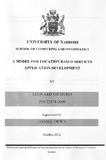| dc.description.abstract | Location Based Services are one of the most rapidly expanding fields of the mobile communications sector, with a vast application range. A location based service is defined as an information or entertainment service, accessible with mobile devices through a mobile network and utilizing the ability to make use of the geographical position of the mobile device. Location based services draw upon a combination of location acquisition technologies, web services and spatial databases. They use knowledge of a mobile device's location to offer value to the mobile subscriber or a third party.
Even though location based services are a hot topic, there are very few publicly available frameworks for the rapid development of location based service applications. This thesis attempts to address this shortfall and come up with a theoretical framework for the rapid development of location based service applications. This is achieved by studying the strengths and weaknesses of, the few, currently available frameworks. The study is further complimented by carrying out a survey on the factors that influence the choice of a framework by lCT professionals. The study then proposes an open framework for rapid development of mobile location based service applications.
It describes positioning prospects using GSM networks, Wi-Fi networks and the GPS system. It further describes a location aware application prototype built based on the proposed framework. This demonstrates that building applications based on the proposed framework is feasible. The said prototype was build based on the Rapid Application Development (RAD) methodology. The prototype as currently build has room for improvement. Further work on the prototype could include making it more interactive by letting users add their own points of interest on the map. The prototype could also be extended to allow users add location based reminders. To allow users to add data to the prototype would mean that the framework would also need to be extended to include a web based database for storing this information centrally. This is achievable. | en_US |

